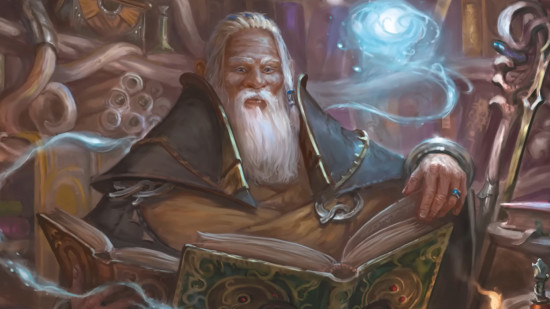Since the “30 or 40 people” that Hasbro CEO Chris Cocks plays DnD with regularly all use AI “for either campaign development or character development or story ideas”, he says it’s a “clear signal” that Wizards of the Coast should be embracing the technology. Cocks made the remarks on Tuesday while answering questions at a business conference hosted by Goldman Sachs.
He was prompted by a conference-goer asking whether AI could “bring the cost curve down” on TV, films, or Hasbro’s digital gaming business. Cocks says that Hasbro is already using AI “as both a knowledge worker aid and as a development aid”, but he is “more excited” about the “playful elements of AI”, and its application in games like Dungeons and Dragons.
Cocks says he plays DnD “with 30 or 40 people regularly” – presumably not all at once – and “not a single person” among them “doesn’t use AI somehow for either campaign development or character development or story ideas”. 30 to 40 of an executive’s acquaintances is not a great polling sample, but we’ve certainly seen DnD fans sharing AI generated art of their character online, and read Reddit threads from people who use AI to assist them with world building and plots.
Cocks has spoken previously about the potential for AI in DnD. Hasbro has the rights to decades worth of DnD books, art, and other media, all of which could, with effort, be turned into training data for AI systems. Cocks says AI might “enable user-generated content”, “streamline new player introduction”, and be used for “emergent storytelling”.
The concept of an AI-assisted chatbot to help new players pick a DnD class that suits their play style, or to quickly tell the which spell their DnD race grants them when they reach level five does seem like it could be helpful. So-called AI systems don’t know anything, they merely perform pattern-matching and pattern-fulfilling behaviours, so there’s always a risk that they such a tool might give an incorrect answer to a prompt. But with a big enough data set and sufficient training, one might perform the task well enough to be useful.
The concept of “user-generated content” and “emergent storytelling” might also work, since the flaws in AI generated media that make it unsuitable for most professional media production workflows – particularly, the fact it can’t iterate on and refine a piece of work – aren’t a problem if you just want something to share with friends.

Unlike other AI tools being used for this purpose, Hasbro would have a very strong claim to own the copyright in any artwork and text that becomes training data for the system. That said, there’s no way that decades of artists and writers could have envisaged such a usage for their work when they signed their contracts, so that may not be open and shut.
Cocks says that when it comes to using AI, “we need to do it responsibly, we need to make sure we pay creators for their work, and we need to make sure we’re clear when something is AI-generated”.
He speculates that these kinds of tools might be used “across not just our hardcore brands like D&D but across multiple of our brands from kids to adults”. What role an AI tool might play for Hasbro’s library of family board games and kids’ toys remains to be seen – a Monopoly conflict mediator, perhaps?
You can listen to Cocks’ full statement from 27:58 in the audio recording of his presentation at Goldman Sachs’ Communicopia + Technology conference.
From Cocks’ remarks, it’s hard to know precisely what role AI has played in Hasbro’s plans to date. There may already be books on the DnD release schedule that partly owe their genesis to an “AI development aid”. But that could be anything from a proprietary lore bot that quickly answers questions about the Forgotten Realms for writers, to a simple AI scheduling assistant, to a disastrous failed project that management has yet to admit was a waste of money.
Will the final result of this strategy be better than Meta’s Snoop Dogg AI Dungeon Master? We must all hope.
Source: Wargamer




